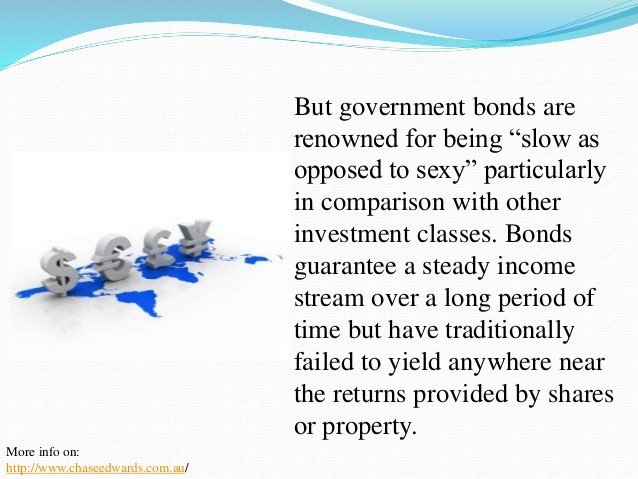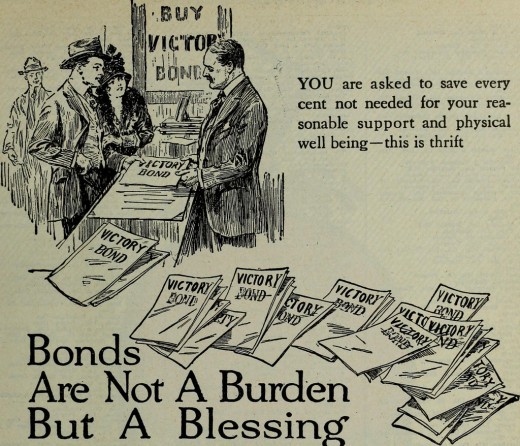Pros and Cons of Bonds
Post on: 27 Апрель, 2015 No Comment

Pros and cons of bonds for issuers and investors
It seems counter-intuitive to think that by lending someone money you are actually going to be the one making money. But that is exactly how a bond works. A bond is issued to lend money to a government or company (more on this in a minute). This article explains how bonds work and gives you a chance to decide if they fit with your financial goals.
Let’s take a look at bonds from the perspective both of the lender and the borrower. You can decide who has the upper-hand.
But first, what exactly is a bond?
When individuals need a loan, they have two options: Borrow from somebody they know or ask the bank for help. When companies need a loan, they have an additional option: They can ask the general public for a loan. They do this by issuing bonds.
Bonds are issued by Governments and companies as a way to borrow money from us, Joe & Jody Public. In return, they agree to pay back back the investor (us), with interest. Additionally, bonds are issued for a specified time-period. The government/company pays the investor interest over that period, as well as returning the original amount (also called “capital”) on the previously arranged end-date.
Company and Government bonds each have their own unique risks and attributes. For the purpose of this article, we will stick to corporate bonds. (But read this article on corporate versus Government bonds for more info). The following is a quick overview of the pros & cons for both the investor (you) and the the issuer (um, them).
Investor (you)
PROs
- Bonds are a fairly safe investment and are created to give you, the investor, regularly pre-scheduled payments.
- In case the company fails to pay the promised payments, you have them by the um, tail. You’ll be one of the first to receive compensation for the loss if the company’s assets are liquidated.
- Even if interest rates go down, you are still guaranteed (by law) to receive the higher rate.
- Even though selling a bond is not as easy and fast as selling stocks on the stock market, there is a market where you can sell it if you really want to (old school like calling up your broker and asking him or her to find you a buyer).

CONS
- Tax, Tax, Tax. Interest payments from bonds are taxed higher than any other investment income. It’s based on the tax rate that you pay on your regular income, it does have the potential to be quite high based on your earnings.
- If interest rates go up you’ll be tied to the lower interest rates. This means that if you’re currently receiving 4%, and the market interest rates go up to 6%, you are still locked into the pre-arranged 4%.
- While the return is fixed, it is limited. You could make much more money if you invested in something riskier, like stocks or ETFs.
- Most bonds pay interest semi annually (twice a year), and some bonds don’t pay any interest until the end (zero-coupon bonds). This is not a good thing if you are looking for something that pays you money more frequently.
The Issuer (The company borrowing money)
PROS
- The company gets money at a lower interest rate than it would have if it tried to get money from any other source (bank, investoretc). This is because the bond is backed by the company’s assets the company uses its assets (buildings, inventory, accounts receivables) to ensure investors that they will get their money back.
- The interest that companies pay to the bond holders are tax deductible, meaning interest can be used to reduce the company’s income taxes (rich always get richer!).
- The better the perception of the company, the better its “credit rating”, which means that it can borrow money at an even more reduced interest rate.
- The company has a clear idea of what it has to pay, when it has to pay. This helps with financial planning.
- The company can use the proceeds from the loan for anything, with very little restriction. This can be very helpful to help a company fund a new growth opportunity
CONS
- The company is putting its assets at risk as the bond holders would have first pick if they cannot meet their interest payments. This means that if a company cannot pay back the investor, the investor has the right to their assets.
- Even if market interest rates fall, the company is still obligated to pay the interest rate payments they’ve already committed to.
- There are only so many bonds that a company can issue. Beyond that, the company starts looking risky, driving its interest rates up.
- There is no formal market for bonds like the stock market, which makes it almost impossible for a company to buy back loans if they wanted to. That means that if the company wants to get rid of its debt immediately, it would be extremely difficult.
See what a bond can do for you…
Understanding the pros and cons of bonds will help you decide whether they fit into your investment strategy. In general, bonds are safe, solid investments that will yield relatively small but steady payments over a long period of time.
Stay tuned for the launch of the bond pit on WallStreetSurvivor.com.














